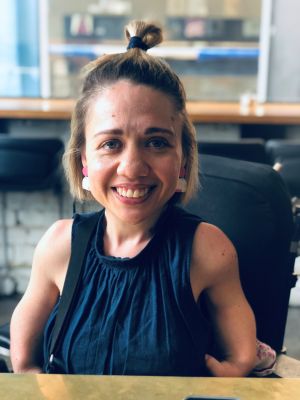
There’s something special about spending time with friends and families in their own homes – this is something I’m rarely able to do.
Dr Beth O’Brien has become accustomed to compromising, finding innovative solutions, and being adaptable in response to the challenges consistently faced when finding suitable housing.
‘I have diastrophic dysplasia, a rare form of dwarfism, which means that I am short in stature and have very short limbs. I use an electric wheelchair full-time for mobility.
I studied psychology at the University of Queensland and graduated in 2013 with a PhD in Social Psychology. I work full-time as a senior officer in the Queensland Department of Education.
In recent years I’ve felt more empowered to be an advocate for people with a disability and to broaden people’s understanding of how systems and spaces create barriers for inclusion, authentic participation and optimal success for people with a disability.
I’ve always found accessible housing hard to come by. Particularly in the inner-city suburbs of Brisbane where my family and I needed to live to access services.
Growing up, we often lived in housing that did not provide easy access into the residence or the ability for me to move around freely inside, which was a big challenge for me and my family.
When you live with a full-time and significant disability, every area of your life presents obstacles to overcome. While this fosters exceptional problem-solving skills, it’s also exhausting. When I think about the impact that not being able to find accessible housing has had on my life, it is substantial.
When I’m out and about accessing the community, it’s common for me to be met with physical barriers that prevent me from accessing spaces or participating fully. My home is my safe space where I can live my life in a way that’s as easy as possible. Now that I need a new wheelchair, this could change. With larger frames now the norm, I’m faced with the prospect of having a wheelchair that is not able to turn around in my bathroom. My home no longer being a place of refuge that accommodates my needs would have a significant impact on my mental and physical health.
The existence of more houses and apartments that are accessible to me would make a huge difference to my life. Especially if these houses/apartments became commonplace in all areas – not just in disability-specific accommodation settings. It’s essential that people with mobility challenges can access suitable housing in the area where they want to live and which provides them access to their workplace, services and their community.
If the new minimum accessibility standards result in a greater number of homes with step-free access, wide doorways, and a bathroom on the ground floor, this would increase the likelihood of me being able to visit their homes in the future. This would make a huge difference to me and would greatly increase my opportunities to spend quality time with my family and friends.’